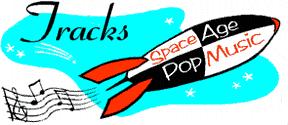When he recorded this album in 1964, Vinnie Bell was just beginning to hit his stride as a session guitarist. He'd already earned a reputation as a tinkerer, a guy who was always experimenting with pick-ups, bridges, and various ancillary equipment to see what new sounds he could produce.
Despite the fact that he was quite capable of playing just about any straight guitar part the job called for, having studied with such masters as Carmen Mastren and Tony Mottola, his gift for special effects was the main thing musical contractors had in mind when they hired him. Fellow guitarist Buzz Feiten recalled that Bell " ... got all the jingle work because he could make the guitar sound like a Wha Wha because he had all these wacky effects which nobody at that time had." Bell's most famous innovation was the invention of the electric sitar, which became a staple of psychodelic pop recordings in the late 1960s.
Bell's gift for gimmickry was something of a double-edged sword. It certainly kept him one of the busier session musicians in a town with lots of busy session musicians, and it made him one of the recognized names in a time of uncredited studio players. On the other hand, it wasn't necessarily where his own stylistic preferences lay. The best example of this is his album Pop Goes the Electric Sitar, where the only real inventiveness, frankly, came before the record was cut, when Bell came up with the instrument in the first place. The solo work on the record itself is quite straight forward and conservative. Had he been playing an acoustic guitar instead of an electric sitar, no one would be paying $40 and up for a copy these days.
The liner notes to Whistle Stop also illustrate Bell's predicament. At the very start appears the following:
SPECIAL NOTE TO THE CONSUMER AND RECORD REVIEWER:
This album contains recordings by VINNIE BELL, at this writing New York's busiest studio guitar player. It is designed to show-case Vinnie's electronic genius and his musicianship. The album is based on the contemporary, popular, instrumental approach to recording. This is not a JAZZ recording.
Talk about a label trying to distance itself from its own artist! The above is liner note-ese for, "Don't listen to this as serious music; it's just a gimmick." The notes go on to say, "Better open the window and get ready to toss out every idea you've ever had about what a guitar should sound like" and praises Bell for coaxing the sounds of a trombone, violin, French horn, cello, pipe organ, and baritone sax out of the guitar through his experimentation. The net effect is to marginalize a perfectly good album.
Admittedly, both Verve and its customers could ask, "A perfectly good what album?" Clearly, Verve, one of the great jazz labels, felt a responsibility to keep this record out of the jazz bins. But it's not really a rock and roll album, either, though "Dawn" is a great two-minute slice of rock. Nor is it easy listening by any stretch of the definition. I'd be interested to know where retailers ended up sticking this record. Not up front, that's for sure. This probably sold under 5,000 copies, and is fairly rare today.
Ah, the curse of in-betweeness that dogs so much of the best Space Age Pop. Whistle Stop is, arguably, Bell's best album by far. It's got a killer ensemble: Bell on lead, Everett Barksdale on bass, and Paul Griffin on organ, with Al Gorgoni on rhythm guitar and Gary Chester and Buddy Saltzman trading tracks on drums. The tracks are individually uncredited, but Bell, Claus Ogerman, and Charles Calello (who did most of the arrangements for the Four Seasons) are all identified as arrangers.
It's tough to pick just one cut to feature, but for me, "Dawn" stands out in its compact intensity. It starts revved up and keeps the pedal to the metal right to the last note. Bell's fuzzed-out tone is pretty remarkable to hear, given that it's just 1964. (On the track just before this, "Fever," we can catch the famous Bell "watery" guitar sound five years before it captured attention in the Ferrante and Teicher hit version of "Midnight Cowboy.") It's the kind of track that blows the dust out of the speakers and leaves compilation makers wondering how to possibly follow it up.
Bell does, by the way, by debuting one of his other inventions, an electrified imitation of the Greek bouzouki he called the Bellzouki (which is also the title of the track). In other words, with another gimmick.
Well, it kept the bills paid. Very nicely, in fact.
(Take note that the album cover spells his name "Vinny," while the back cover reads "Vinnie," which is correct. Pretty easy to guess that Verve didn't plan on releasing a second Bell album.)
S p a c e A g e P o p M u s i c
Home · Listener's Guide · The Songs · Who's Who · Liner Notes · Selected Tracks · What's New · Search
© spaceagepop 2019. All rights reserved.


